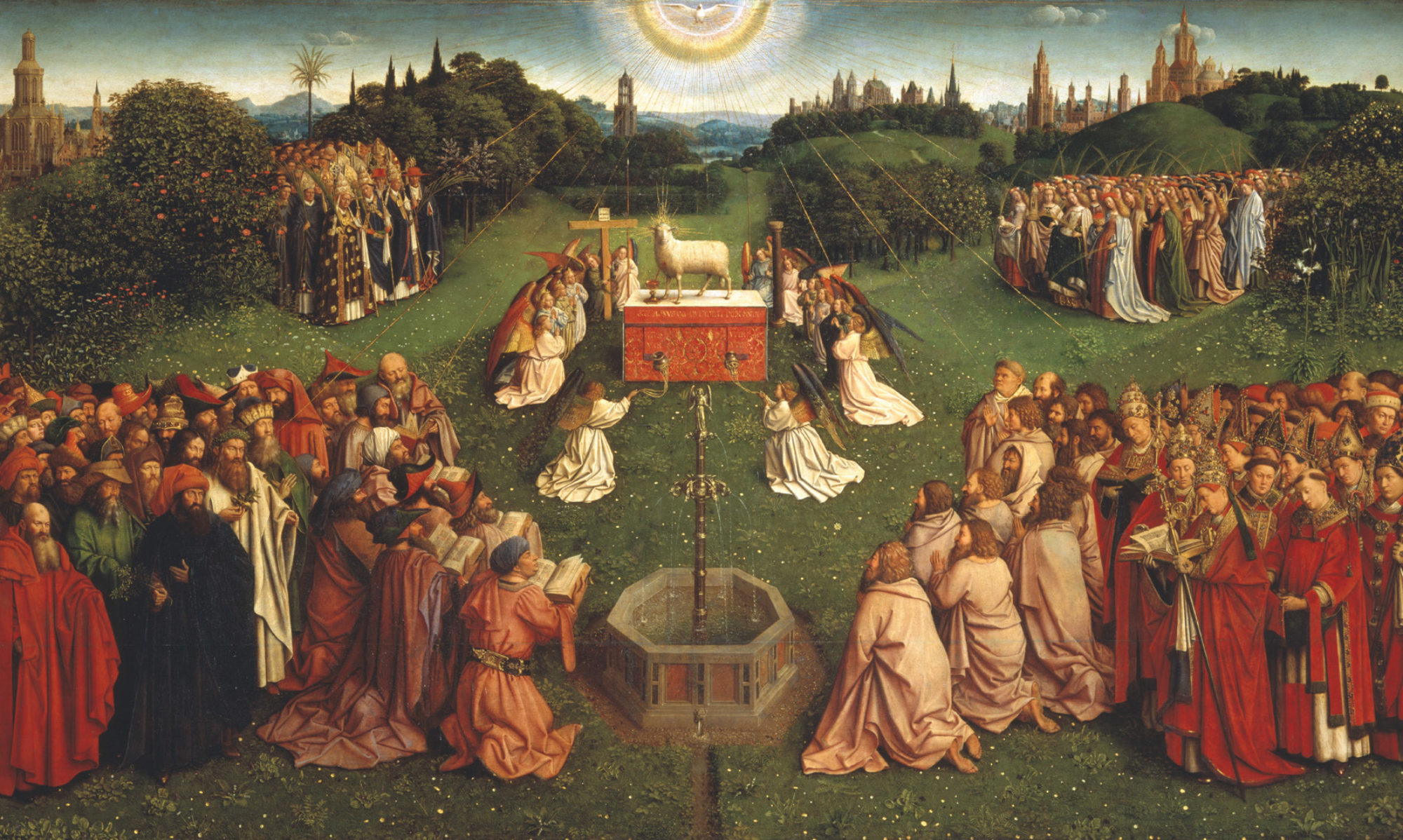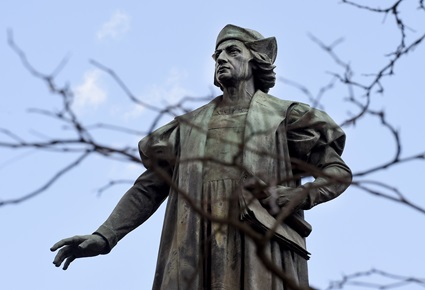In 1502, Christopher Columbus undertook his Fourth Voyage, which skirted the Yucatan and the Isthmus of Panama in search of a waterway to the Pacific. This voyage was full of misfortune for Columbus: the Spanish authorities in Hispaniola refused his requests for supplies, a hurricane struck his fleet, and he was in ill health, spending most of the voyage in his sick bed on the verge of death.
These misfortunes, however, became the occasion of a wondrous prodigy, which saw the pious Admiral (who was a Third Order Franciscan and deeply devout) work a miracle which saved his crew from certain destruction. The following is taken from John O’Kane Murray’s Christopher Columbus, Part 1 in the “Lives of Catholic Heroes and Heroines” of America series and is referened in the letters of Columbus’s son, Ferdinand, who accompanied his father on this voyage as a young boy.

“Steering along the coast of Honduras, [Columbus] reached a cape to which he gave the name Gracias a Dios in pious thanksgiving for the southerly turn taken by the land at that point. The east winds, which had hitherto obstructed him were now favorable to his course along the coast. The Admiral himself was unable to move, but as it was Sunday, and the eve of the Feast of the Assumption, Don Bartholomew [Columbus’s brother] and the captains and many of the men went ashore to hear Mass. Then there soon followed a weary struggle against head-winds and contrary currents, with continual rain and water-spouts, and such dreadful lightning that death and the end of the world were in the thoughts of all. Father Alexander, a Franciscan, the only priest on board, administered the sacraments to all on the same ship with him, and in the other vessels the men made their confessions to one another, and waited for death.
The Admiral recorded that the stoutest hearts quailed, and that he had never known a tempest so violent and so long enduring, and that in sixty days they had advanced only seventy leagues. He felt his own end approaching, and was distressed to think that he was directly responsible for the death of his brother and his son, whom he had persuaded to bear him company.
But though they had been pursued by rain, and storm, and lightning, the greatest danger was now at hand. On the 15th of December while the Admiral was still in bed, and seemingly in his last agony, wild shrieks came from one of the vessels. The sounds of terror were re-echoed from the others. These cries of despair resounded in the sad but brave soul of the almost dying Columbus. He opened his eyes. He shuddered. He struggled on deck. What did he see?
At a certain point the ocean seemed to be agitated by violent movements It swelled with the waves, which it attracted to this center, and arose as a single mountain. Dark clouds descended in the form of a reversed cone, and stretched themselves down to the whirlpool, which gradually arose to meet the atmospheric cone. These two huge forms of cloud and sea suddenly met, and were soon locked together in the form of a whirling X. “It was one of these water-spouts,” writes Charlevoix, “which seamen call fronks, which were then so little known, and which have since submerged so many vessels.” A sharp, hissing noise preceded the fatal whiff of this frightful form—then without a name in our language—now known as the typhoon.

Columbus, who was always greatest in danger, and equal to any emergency when battling with the unruly elements, became suddenly re-animated. He saw the monstrous form approaching. The sea appeared to be sucked up towards the very sky. What was to be done? It was a new danger. Art was useless; navigation, powerless; experience, nothing. To that noble mind, full of a grand and holy faith, there was yet one resource, and only one. He would call on God. He had blessed candles at once lighted, and placed in the lanterns. Though scarcely able to stand, the venerable Admiral girded his feeble frame with his sword, over the cord of St. Francis; and hastily seizing the New Testament, he stood boldly on the prow of his ship, facing the water spout, which was coming near. He began to read the Gospel of St. John, trying to raise his voice above the howling of the awful tempest. When he came to the expression, “And the Word was made flesh and dwelt amongst us,” the aged Christian hero commanded the water-spout to spare the children of God who were laboring to carry the Cross to the ends of the earth; and, full of faith, he drew forth his sword and traced in the air the holy sign which once met the eyes of Constantine, and gave him the promised victory. The water-spout, which was coming straight towards the caravels, suddenly appeared to change its direction, passed between them, and went off bellowing, to lose itself in the immensity of the Atlantic!
When we come to consider the smallness of the caravels, and the fearful force of a tropical cyclone, we are quite justified in feeling that the escape of Columbus and his crews was nothing short of a miracle. At last, after eight days’ tossing to and fro, the mouth of a river was gained. The Admiral named it Bethlehem, because he entered it on the day of the Epiphany.
Pains, trials, and disappointments—too numerous to relate here—now crowded around the thorny pathway of the great Admiral. His own strength was exhausted by sickness. His ships were leaky and very unsafe. The sea and the heavens persisted in their inclemency; and he saw only gloom and heart-rending anguish among the sailors. One day in the midst of this desolation, sleep closed his eyes and fell into an exhausted sleep. His afflicted soul heard a “tender voice” say:
Oh, thou fool, slow to believe and to serve thy God—the God of all! What more did He for Moses, or for his servant David, than He has done for thee? From thy birth He has taken the greatest care of thee. When he saw thee come to a fitting age, He made thy name to resound wondrously throughout the earth. The Indies—those wealthy regions of the world—He gave thee for thine own, and empowered thee to dispose of them according to thy pleasure. To thee He delivered the keys of the ocean gates which were closed with mighty chains. Thy orders were obeyed in many countries, and among Christians thou didst acquire honorable fame. What more did He for the people of Israel when he led them from Egypt? Or even for David, whom, from being a shepherd, he made King of Judea? Turn, then, to Him, and acknowledge thy error. His mercy is infinite. Thy age shall be no impediment to any great undertaking. Thou urgest for succor despondingly. Answer! who hath afflicted thee so much and so many times—God, or the world? The privileges and promises which God hath made to thee, He hath never broken; neither hath he said, after having received the services, that his meaning was different, and was to be understood in a different sense. Never doth he inflict pain in order to show forth His power. He performs to the very letter. He fulfills all that he promises, and with increase. Is not this His custom? I have shown thee what thy Creator hath done for thee, and what he doth for all. The present is the reward of the toils and perils thou hast endured in serving others.
“In hearing this,” writes Columbus, “I was as one almost dead, and had no power to reply to words so true. I could only bewail my errors. Whoever it was that spoke to me finished by saying: ‘Fear not! Have confidence. All these tribulations are graven in marble, and it is not without cause.’”
After various trials and adventures along the Isthmus of Panama, and having sustained the loss of two caravels, Columbus felt obliged to give up hunting after the strait which he fancied led to the Pacific. He steered north-wards towards Cuba. A collision between his two remaining vessels rendered them still more unfit to cope with the powerful squalls and breakers of the West Indies. In the middle of June, however, with his crews in despair, nearly all his anchors lost, and his vessels worm-eaten so as to be “as full of holes as a honey-comb,” he arrived off the southern coast of Cuba. (1)

During the 19th century, there was a movement—spearheaded by Italian-Americans—to canonize Christopher Columbus. Though this movement proved of no avail, Pope Leo XIII praised Columbus as a hero of faith, saying that, “Since [Columbus’s] Catholic faith was the strongest motive for the inception and prosecution of the design, the whole human race owes not a little to the Church” and called his exploits “the highest and grandest which any age has ever seen accomplished by man.” (2) To learn more about the movement to canonize Christopher Columbus, see the article “The 19th Century Movement to Canonize Columbus” at Catholic Exchange.
Click here to purchase John O’Kane Murray’s Christopher Columbus, the book the above excerpts are taken from. Murray’s work was originally published in 1883 as part of the effort to canonize the great Genoese admiral; it has been reprinted by Cruachan Hill Press.
(1) John O’Kane Murray, Christopher Columbus (Cruachan Hill Press: Grass Lake, MI., 2021), 166-168
(2) Pope Leo XIII, Quarto Abeunte saeculo, 2, 1
Phillip Campbell, “The Miracle of Christopher Columbus,” Unam Sanctam Catholicam, October 14, 2024. Available online at https://unamsanctamcatholicam.com/2024/10/the-miracle-of-christopher-columbus

